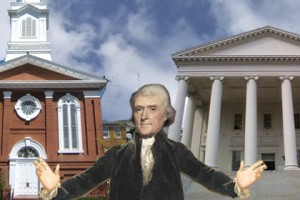 Where does the phrase “a wall of separation between Church and State” come from?
Where does the phrase “a wall of separation between Church and State” come from?
The Constitution?
The Declaration of Independence?
Jefferson’s Letter to the Danbury Baptists?
The First Amendment?
The Articles of Confederation?
Did you guess correctly?
The phrase “a wall of separation between Church and State” comes from the pen of President Thomas Jefferson when he wrote to a group of Baptists in Danbury, Connecticut. They were concerned about the possible establishment of a church that they would be required to attend.
Jefferson wrote to ensure them that their free practice of religious liberty would never be interfered with by the government, for that would go against the will of the people and the Constitution. Jefferson closed his letter by thanking them for their prayers on his behalf.
“Believing with you that religion is a matter which lies solely between Man & his God, that he owes account to none other for his faith or his worship, that the legitimate powers of government reach actions only, & not opinions, I contemplate with sovereign reverence that act of the whole American people which declared that their legislature should “make no law respecting an establishment of religion, or prohibiting the free exercise thereof,” thus building a wall of separation between Church and State. Adhering to this expression of the supreme will of the nation in behalf of the rights of conscience, I shall see with sincere satisfaction the progress of those sentiments which tend to restore to man all his natural rights, convinced he has no natural right in opposition to his social duties.
I reciprocate your kind prayers for the protection and blessing of the common Father and Creator of man, and tender you for yourselves and your religious association, assurances of my high respect and esteem.” – Thomas Jefferson, January 1, 1802.
What was the original intent of President Jefferson in speaking of this wall of separation?
Notice that the phrase “a wall of separation between Church and State” was used to describe religious liberty being protected by the government. In other words, the Government has no right to impose its will regarding matters of religion, so a separation of church and state would be built for this very purpose – to make sure religious liberty was always protected. The wall protected the Church from the federal government.
The phrase is used by many in our day in the exact opposite manner to its original intention. It is used to exclude the Bible and prayer from public schools, and the Ten Commandments from our Court buildings. We ask God to bless America, but at the same time seek to remove Him from every sector of society.
We are one nation under God, not without Him. The misinterpretation of Jefferson’s words continues to impact us greatly, making us a more and more secular nation with each passing year. Yet with our founding fathers we cry, “Blessed is the nation whose God is the LORD.” Psalm 33:12

I’m curious,
If Jefferson’s words were not abused and the Religion of Christianity was infused into the American culture, wouldn’t that of made America a Theocracy?
I think one of the things at the heart of the new nation emerging was that never was ONE religion or denomination to rule. Each citizen was to have the right to believe according to their individual conscience rather than only according to the Church of England. I would say that this principle, by itself, eliminates any potential of a theocracy being formed.